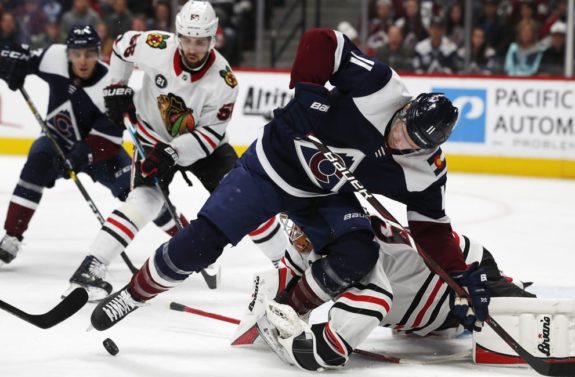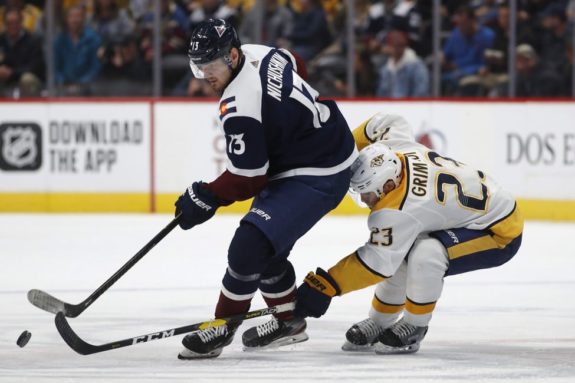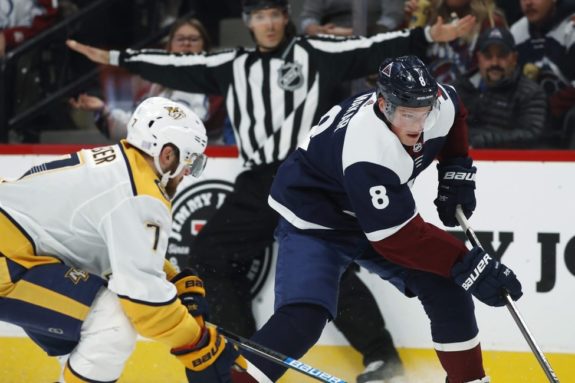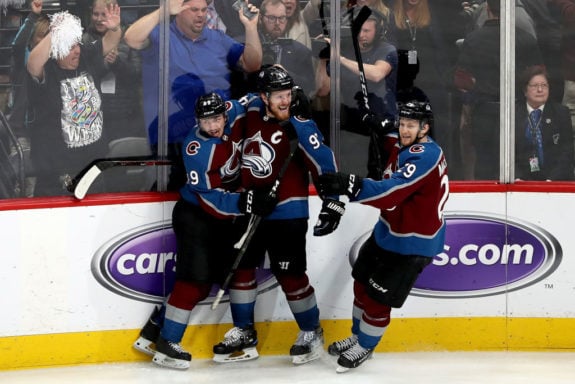
 J.D. Killian
The Hockey Writers
J.D. Killian
The Hockey Writers
29
Reads
0
Comments
Avalanche Streak to the All-Star Break
The Colorado Avalanche headed into the All-Star break running on a much-needed five-game point streak. Racking up eight points in those five games helped the Avalanche re-establish themselves as the second seed in the Central Division. Even better, they managed to earn those precious markers during a five-game home stand, redeeming themselves on the Pepsi Center ice.
How did the Avalanche manage to regain their mojo?
They finished December limping through four home losses. Losing was bad, but the way they lost was worse. It seemed the team kept inventing new ways to lose, finding ways to blow third-period leads as the clock wound down. The Avalanche surrendered goals in six consecutive games to close out 2019, losing five of the contests.

The team continued to struggle as January rolled around. The Avalanche started the month with two wins followed by another two losses coming from poor third period performances. The Avalanche were falling in the standings. Nightmares of last season’s two-month slump haunted fans. Would history repeat itself?
No.
The Avalanche resurged to dispel those fears. To everyone’s surprise, a five-game home stand allayed those concerns. They reclaimed lost ground with each game. Let’s break down the progress made in each matchup.
Building From Overtime Losses
It’s odd to consider an overtime loss as a building block to reversing a losing curse. However, when the Avalanche took on the Pittsburgh Penguins on Jan. 10, that’s exactly what happened.
Colorado entered the third period with yet another lead. Once again, they watched their one-goal advantage disappear, heading into the final moments instead trailing by a goal. The Avalanche hadn’t been able to find a way to come back from a deficit in the third period all season. Yet.
With only 30 seconds remaining, Matt Calvert tipped in a Cale Makar shot to tie the contest. Though the team went on to lose in overtime, they proved they could come back in third period. It was a step in the right direction. And they earned a point.

The next matchup against the Dallas Stars proved to be a different kind of challenge. Dallas played their stiff control game. However, the Avalanche got off to a two-goal lead in the first period. The Stars answered with a goal in the second frame. The third period saw the Avalanche surrender the lead, allowing the Stars to tie the game with a little over five minutes left in the matchup. It looked to be yet another lost opportunity and fans braced for the coming onslaught.
But it didn’t happen. The Avalanche allowed only one goal against them in the third period instead of the host of goals that had become all too familiar recently. The Stars couldn’t get another puck past goaltender Philipp Grubauer until overtime. The team had found a way to slow the third period onslaught and garner another point. It was another step in the right direction.
The losses were frustrating but the Avalanche were finding ways to get points.
Wily Wins
Colorado hosted last season’s playoff foes, the San Jose Sharks next. The Sharks were not playing like the powerhouse team of the past but it would be a good test for Colorado. Could they beat a struggling team who had ousted them from the postseason?
The Avalanche came on like… an avalanche. Less than a minute in, Valeri Nichushkin opened scoring and the team never looked back.

They scored four times and didn’t allow a single goal against in the third period. Grubauer got his first shutout of the season and the Avalanche had conquered their third period demons. They also picked up two points.
Next up, the St. Louis Blues came to the Can. The defending Stanley Cup champions had been a challenging matchup for the Avalanche in the past. The clash of styles frequently put Colorado on the losing end. The Blues played their stifling game, limiting the Avalanche to only 18 shots on goal in the entire game.
Both teams scored in the first. The Blues launched into the second, notching a goal a minute into the period. Down by one, the Avalanche hustled back and scored three unanswered goals, carrying a precious two-goal lead into the dreaded third.
The Blues battled back when their captain, Alex Pietrangelo, released a wrist shot that made it past Grubauer. Down by one, the Blues had over 12 minutes to find a way to score. But – in an amazing turn of events – they didn’t.
Every Avalanche player stepped up their defensive game, sacrificing their bodies, battling for pucks, and disrupting the Blues. St. Louis pulled their goaltender in the final minutes in an effort to tie the contest. The Blues struggled to get their shots through traffic to the net. Then the Avalanche stole the puck and Gabriel Landeskog used a wicked wrister to seal the win, hitting the empty net with two seconds remaining. The Avalanche had successfully defended a third-period lead against a quality team. Another step forward. Plus two more points.
The Avalanche took on legendary rival, the Detroit Red Wings, two days later. It had all the hallmarks of a trap game for Colorado. The Avalanche had rediscovered their winning ways, yet were facing a struggling team at the bottom of the standings. The All-Star break was lurking on the other side, offering ten days of much-needed rest and relaxation. It would have been easy to look past the matchup and focus on vacation.
Instead, Colorado came out flying, throwing pucks at the net. But they were repeatedly getting denied. The club racked up 18 shots on goal but Detroit goaltender Jimmy Howard came up big, denying each and every one of them. Though the Avalanche appeared to dominate the on-ice play, they exited the frame down a goal to the Red Wings. Would the Avalanche lose heart and back off?
Nazem Kadri answered the question a minute into the second period. He tied the game as he tipped in an Andre Burakovsky shot.

Nathan MacKinnon knocked in a wrist shot less than two minutes later. And the team kept shooting the puck, lobbing 16 shots at Howard during the second period, putting them ahead 2-1.
The Avalanche entered the third period like a team on a mission. They potted two additional goals in the first five minutes and added two more later in response to two Detroit goals. Colorado walked away with a 6-3 win. In the process, they held the Red Wings to 25 shots on net while the Avalanche fired 46 at Detroit. Two more points to add to the standings.
They closed out the home stand collecting eight points in five games. The Avalanche overcame their third period struggles and re-gained their position in the standings.
Key Improvements
The biggest shift for the Avalanche in the past few games was the mental upgrade. They quit finding ways to lose in the third and battled back. Instead, they discovered how to bounce back and win.
A couple key pieces reflect that shift. During the five games, something interesting happened on the scoring front.
First, 16 different players earned points and 15 of them got two or more points. While MacKinnon was his usual amazing self, scoring four goals and four assists during the time frame, other players also stepped up.

Landeskog notched three goals, Burakovsky tallied six points, and Kadri racked up two goals and two assists. Even Calvert managed to add a couple tallies, including a beauty of a short-handed goal. During the four previous home losses, only four different players earned goals. In contrast, nine different players notched goals during the point streak.
Even the defense pitched in on the scoring front. Five different blueliners contributed 15 points. Makar and Ryan Graves each contributed two goals and three assists.

Nikita Zadorov added a goal and three assists, Ian Cole contributed three assists and Samuel Girard added two assists. In the prior four home losses, only one defenseman scored a single goal – Graves.
Depth scoring wasn’t the only stand-out. The penalty kill unit deserves some credit, too. They allowed only two goals against in 13 short-handed situations. The Avalanche successfully defended their zone 84.6% of the time when down a player in the five-game stretch. That’s a significant improvement from their 20th-ranked season average of 79.1% and would be the best in the league if that was for the whole season.
The Avalanche also substantially outshot their opponents. During the streak, the team outshot their foes by 30 combined shots in five games. For the season, they have only racked up 53 more shots on goal than their rivals. Over half of the difference came during the past five games.
Taking Stock
As coach Bednar has been saying, the Avalanche only needed to work on tweaking a few key things and they would get better results. The coaches found a way to work around the problem areas and the players cleaned up their game. The results are encouraging.

The Avalanche sit second in the Central Division and the Western Conference. They entered the All-Star break only six points behind the Blues. Colorado’s 62 points put them seventh in the league and on pace for 103 points at the season’s end. Now, they have 10 days of rest before returning to the rink.
There’s still a lot of hockey ahead and anything can happen. How they come back from the All-Star break could very well set the course for their 33 remaining games. However, finding ways to break out of a slump before it’s taken them out of the playoff picture is a huge step forward for a club that has relied on wild card spots to get them into the postseason. They need to rest up now. The race to the playoffs heats up in a week.
The post Avalanche Streak to the All-Star Break appeared first on The Hockey Writers.
Popular Articles

















































 Canucks Vancouver
Canucks Vancouver Sharks San Jose
Sharks San Jose Flames Calgary
Flames Calgary Avalanche Colorado
Avalanche Colorado Coyotes Arizona
Coyotes Arizona Golden Knights Vegas
Golden Knights Vegas Wild Minnesota
Wild Minnesota Red Wings Detroit
Red Wings Detroit Blues St. Louis
Blues St. Louis Blackhawks Chicago
Blackhawks Chicago Blue Jackets Columbus
Blue Jackets Columbus Hurricanes Carolina
Hurricanes Carolina Jets Winnipeg
Jets Winnipeg Predators Nashville
Predators Nashville Ducks Anaheim
Ducks Anaheim Oilers Edmonton
Oilers Edmonton Sabres Buffalo
Sabres Buffalo Rangers New York
Rangers New York Bruins Boston
Bruins Boston Panthers Florida
Panthers Florida Senators Ottawa
Senators Ottawa Lightning Tampa Bay
Lightning Tampa Bay Capitals Washington
Capitals Washington Islanders New York
Islanders New York Devils New Jersey
Devils New Jersey Maple Leafs Toronto
Maple Leafs Toronto Flyers Philadelphia
Flyers Philadelphia Penguins Pittsburgh
Penguins Pittsburgh Stars Dallas
Stars Dallas Kraken Seattle
Kraken Seattle Kings Los Angeles
Kings Los Angeles


